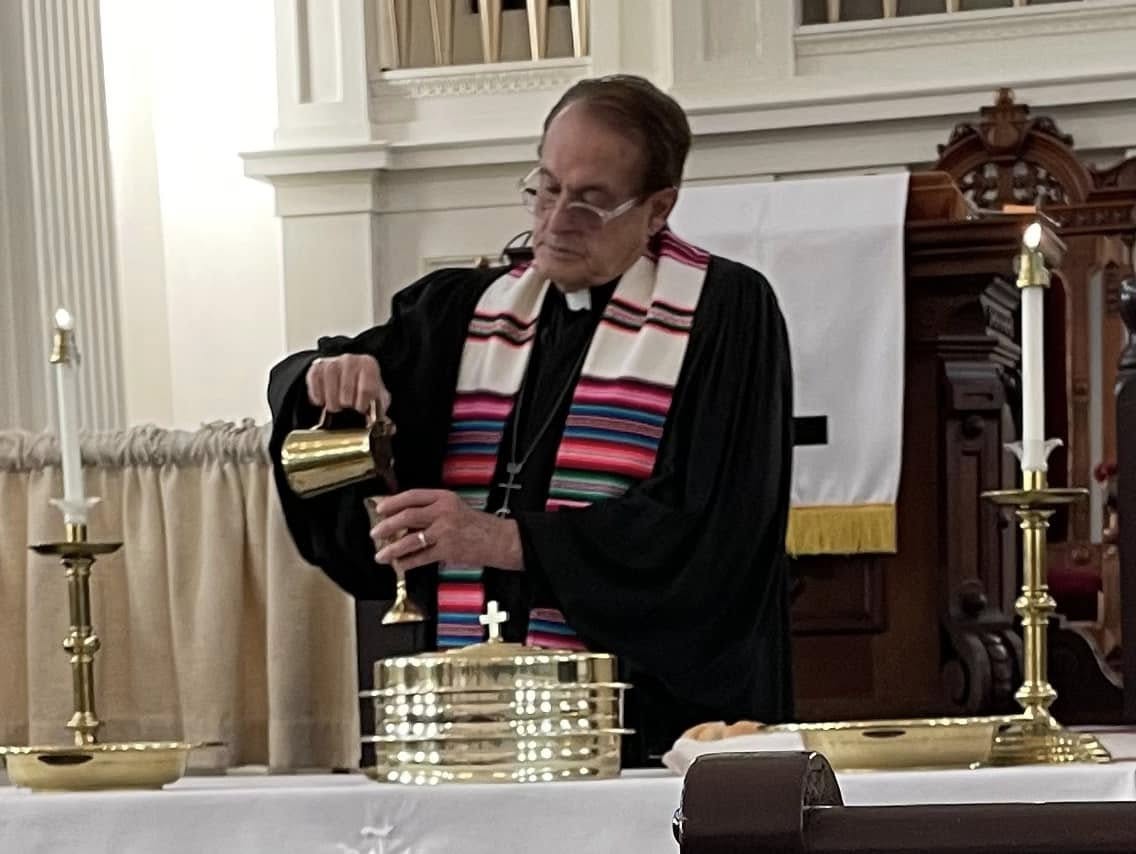Sermon Sunday July 6th, 2025
Rev. Norman A. Michaud
Luke 10: 1-11, 16-20
The Gospel reading today focuses on Jesus’ instructions to his followers concerning their appointed mission to present themselves to strangers. The instructions provide much detail. Seventy-two missionaries are to travel in pairs. They are not to accept whatever food they may be offered by those who provide food. No dietary restrictions are applicable. Marginally faithful Jews, excessively devoted Jews, and Gentiles may reject or welcome Jesus’s followers. Jesus notes that these missionaries will be “like lambs in the midst of wolves.” They are to travel with no possessions, not even sandals. If they are invited into a home, they are to say, “Peace to this house.” The missionaries are to “cure the sick” and say, The kingdom of God has come near to you.” Even if the occupants of a house or town reject those missionaries, they are to move on and bless those who listen, but those who fail to listen fail to listen to God.
Our Congregationalist tradition has had its missionaries. More often than not, our missionaries went to the places where indigenous people dwelt. Native Americans sometimes greeted them and sometimes proved hostile. Congregationalist missionaries traveled the world. They never came with a sword or forced conversion through violence. Often, they learned the local language and translated the Bible into that language. People were to be converted by the presence and actions of love, not cruelty. Christian communities exist worldwide because of these men and women who risked their lives by showing up and being kind. Not all were successful.
Mistakes were made and reparations were paid.
The Congregationalist missionaries who went to Hawaii failed not because they were not faithful, but because they acquiesced to the wishes of traders who sought to exploit the Hawaiian people. James Michener’s book “Hawaii” documents the history of their failure. However, those who worked in the world as missionaries did convert millions to the Christian faith.
While I was still a graduate student at UNH, two young men, suited in black, came to the door of my “affordable housing unit” which had served as temporary homes for military families during World War II. Seven hundred and fifty dwellings sat on cinder blocks, and insulation was minimal. Gas and water pipes were exposed to the elements. I worked off my rent and often repaired broken pipes under the buildings.
The suited missionaries carried copies of The Watchtower, which I knew to be the publication of Jehovah’s Witnesses. I invited them in. Once seated, I told them about how I had already seen the Celestial City and, therefore, knew I was one of the chosen saved 144,000 who would dwell on earth after Armageddon. Since the purpose and mission of their faith was to see and live in Paradise on Earth, they seemed pretty upset, for they wondered if they would be chosen or not. They left discouraged. I had turned the tables on them.
I recall answering the door at my parents’ home. Two young men in black suits, white shirts, black ties, and polished shoes occasionally came knocking at the door. We met missionaries from The Church of Jesus Christ of Latter-day Saints and the Seventh-day Adventist Church. I would fetch my mother, and she would pleasantly meet them at the front door and send them on their way. She thought of them as door-to-door salespeople, whom she disliked.
During the Presidential Primaries, New Hampshire is known for its “retail” politics. I met many candidates who hoped to win New Hampshire’s first-in-the-nation primary. Many faded into history once they lost. I also witnessed the shift from personal politics to well-orchestrated television events, which often seemed comical.
Once, in 1976, I happened to be at my mother’s home when a couple knocked on the door. The man was wearing a black suit, a crisp white shirt, and a tie. His wife, Rosalynn, wore a gray suit. He introduced himself with a soft southern accent, “Hi, my name is Jimmy Carter, and I am running for President, and this is my wife Rosalynn.” They carried no pamphlets or campaign materials. I thought my mom would dismiss them, but they seemed sincere and earnest. She welcomed them and invited them to sit in the living room. They were a sweet couple. I noted their shoes were well-worn. They were conducting their campaign door-to-door as if they were missionaries. The Carters had a mission, and they were not afraid to blend politics influenced by their faith. They invoked Gospel passages as justification for what they hoped the United States would become. For them, God’s kingdom was near.
My mother, Helen, offered them iced tea. We sat with them for about 20 minutes and listened to them. Rosalynn didn’t say much but nodded often. He had grand plans, but he was a Southerner from Georgia, a governor, and a former nuclear submarine Captain, which we held in high esteem due to his connection to the Portsmouth Naval Shipyard. Both were gracious and shared a new vision for America following the Watergate scandal and the end of the Vietnam War. When they left, my mother, though happy to meet them, said, “What nice people. Too bad he doesn’t have a chance here in New Hampshire. We would never choose a Southerner in the primary.” However, once the primary arrived, we both voted for him, and his New Hampshire primary victory launched his successful campaign for President.
The door-to-door campaign Carter and Rosalynn chose seemed the closest experience I have encountered to what Jesus asked of his seventy-two followers. People who canvas for political candidates follow Carter’s example. Many doors remain unanswered, and some face outright rejection and hostility. Still, canvassers dust off their feet and move on to the next dwelling.
Like Christ’s followers in Luke, the Carters travelled light. They paid attention to the people they met. They seemed not to be driven by vainglory and listened well to those who conversed with them. They called for us to be good neighbors. They engaged with people and spoke sincerely about justice and peace. They showed love and grace through their actions and continued to do so throughout their lives.
Like faithful followers of Christ, they offered a chance to begin again, offered forgiveness for past injustices, and offered hope, not fear. Like the followers of Christ in Luke’s narrative, they asked those they met to participate in the living faith with meaning and purpose, in community.
People seek meaning, community, purpose, and a source of engagement with the world as willing participants in it. Every generation wants this. We often discuss the choices young adults will make and why. It is too easy to spend one’s life analyzing data, dwelling on the past, and putting off decisions. However, in every generation, we face difficult choices, experience moments of uneasy peace, and acknowledge that our mistakes and failures can be corrected.
Mistakes and failures are hard to accept, but it does not negate the Gospel. Sometimes we project our certainty of belief onto the outcomes of our work. But faith orients us not so much for success as for authenticity. The 72 returned with joy, which reminds one that our joy may be found through successful outcomes, incremental change, and the restoration of sustained hope. Joy, rooted in faith, moves us toward living in God’s world, which is here and now, as Christ promised. However, we must remember that life on earth should be guided by our hope, love, and grace, just as it is i


